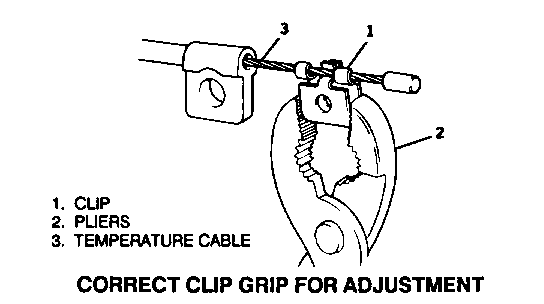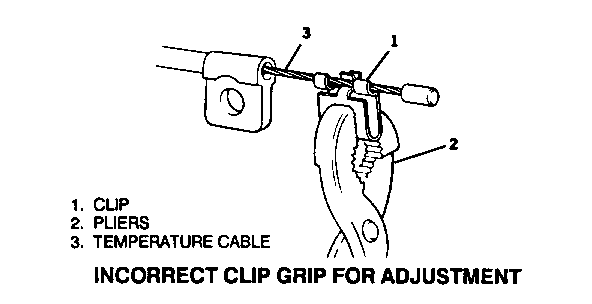LOW HEATER OUTPUT DIAGNOSIS REVISED TEMP. CABLE ADJUSTMENT

SUBJECT: REVISED PROCEDURE FOR LOW HEAT DELIVERY RELATED DIAGNOSIS (ENHANCED TEMPERATURE CONTROL CABLE ADJUSTMENT)
VEHICLES AFFECTED: 1989-91 "J" AND "N"
On customer comments of low heater output on 1989-91 J and N cars, before replacing a suspected defective engine cooling thermostat, proper diagnosis of the condition must be performed to avoid the possibility of a repeat repair. Follow "Diagnosis" as shown in Section 1A/lB of the appropriate Service Manual.
After completing the diagnosis, use the following as a guide to the next corrective step:
* If the diagnosis indicates a defective thermostat, refer to Section 6C for replacement.
* If the diagnosis indicates a defective temperature control cable, refer to Section 1A/IB for replacement.
* If the diagnosis indicates the temperature control cable is no longer "snapped" into its retainer, refer to "Temperature Control Cable Repair" in the 1991 Service Manual, Sections 1A/1B.
* If the diagnosis indicates that the temperature control cable is out of adjustment, refer to the following procedure to repair.
TEMPERATURE CONTROL CABLE ADJUSTMENT PROCEDURE
Condition: 1. "Spring back" off full "hot" temperature control position (or not attaining full "cold" temperature door position).
ConditiOn: 2. "Spring back" off full "cold" temperature control position (or not attaining full "hot" temperature door position).
Cause: The temperature control cable "clip" needs adjustment. Refer to the illustration for correct gripping of the "clip" during adjustment.
Correction:
----------- For Number: 1. Grip "clip" at module end of cable while pulling temperature control lever to "hot" position.
Correction For Number: 2. Grip "clip" at module end of cable while pushing temperature control lever to "cold" position.
NOTICE: FAILURE TO GRIP "CLIP" CORRECTLY WILL DAMAGE ITS ABILITY TO HOLD POSITION ON THE CABLE. THE TEMPERATURE CONTROL CABLE MUST BE REPLACED IF "CLIP" RETENTION FAILS.
Verify correct adjustment after repair by observing for no, or very little, "spring back" of the temperature control lever and listening for temperature door "slam" when the control lever is moved to full hot and cold positions quickly.
Please update your copies of the Service Manuals in Sections 1A and 1B, under "Temperature Control Cable", with these new adjustment instructions.


General Motors bulletins are intended for use by professional technicians, not a "do-it-yourselfer". They are written to inform those technicians of conditions that may occur on some vehicles, or to provide information that could assist in the proper service of a vehicle. Properly trained technicians have the equipment, tools, safety instructions and know-how to do a job properly and safely. If a condition is described, do not assume that the bulletin applies to your vehicle, or that your vehicle will have that condition. See a General Motors dealer servicing your brand of General Motors vehicle for information on whether your vehicle may benefit from the information.
